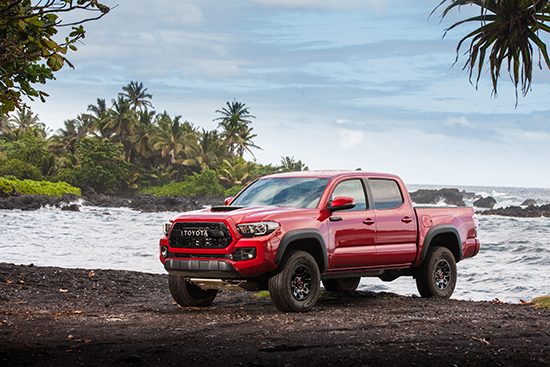Toyota and Lexus Top 2016 Consumer Reports Reliability Survey
Tim Esterdahl | Oct 25, 2016 | Comments 8
With nearly a half million responses from everyday owners, creating good statistical probability, Toyota and Lexus once again top the 2016 Consumer Reports Reliability Survey with the most reliable vehicles on the market. However, this isn’t to say all their vehicles are reliable with the head-scratcher of the 2016 Toyota Tacoma now being considered as having average reliability.

The 2016 Consumer Reports Reliability survey goes out to millions of Consumer Reports subscribers and the non-profit’s team of statistical experts goes through the data to determine whether or not there is enough data and to make sure it isn’t fraught with irregularities. The statistical analysis is one of the ways Consumer Reports sees their survey as being better than other groups data. It is a very scientific process.
After this survey goes out, it is then collected electronically and Consumer Reports staff crunches the data to give us the list of the best and worst vehicles. Here are the results.
The 2016 Consumer Reports Reliability Survey Results
Most Reliable Brands
- Toyota
- Lexus
- Buick
- Audi
- Kia
10 Most Reliable Cars
- Toyota Prius
- Lexus CT 200h
- Infiniti Q70
- Audi Q3
- Lexus GX
- Lexus GS
- Mercedes-Benz GLC
- Chevrolet Cruze
- Audi Q7
- Toyota 4Runner
10 Least Reliable Cars
- Fiat 500L
- Ford Fiesta
- Chevrolet Tahoe/GMC Yukon
- Ram 2500
- Tesla Model X
- Chrysler 200
- Chevrolet Suburban/GMC Yukon XL
- Jeep Renegade
- Ford Focus
- Cadillac Escalade
Newly Recommended Models
- BMW i3
- BMW x5
- Cadillac XTS
- Chevrolet Camaro
- Chevrolet Corvette
- Chevrolet Cruze
- Chrysler 300
- Ford Escape
- Hyundai Santa Fe
- Mercedes-Benz GLC
- Porsche Macan
- Tesla Model S
No Longer Recommended
- Audi A3
- Chevrolet Volt
- Dodge Durango
- Ford F-150
- Honda Civic
- Lincoln MKX
- Mini Cooper
- Subaru WRX/STi
- Volkswagen GTI
- Volkswagen Jetta
- Volkswagen Passat
Interesting, Consumer Reports says the 2016 Toyota Tacoma fell in their analysis and is now considered “average.” How this happened is simply beyond me since Toyota really didn’t change very much on that truck and in fact the changes they did make? Really improves the product.
Background on Consumer Reports
At the 2016 Texas Auto Writers Association Truck Rodeo, a Consumer Reports representative (I’m withholding his name due to professional courtesy) shared with the group how they conduct testing and how they evaluate vehicles. After this presentation, I was fortunate enough to spend a considerable amount of time with this representative. While we talked, argued and laughed at common automotive journalism mishaps, I was able to finally understand how Consumer Reports works and while their results can be, well, “interesting.”
What amazing things did I learn? First, Consumer Reports purchases all of their own vehicles. Second, they are barred from going on any media trips (like the ones I go on). Three, they conduct their testing as scientifically as they can. Four, trucks and off-road vehicles (in my opinion) are a blind spot for the organization and they test them they do cars (on pavement mostly, day-to-day commuting).
As a truck guy and a journalist, I am more mixed on Consumer Reports role in automotive now that I understand how it works. Why? First, purchasing the vehicles is fine, but why do it? I guess because it seems to take away the notion that you owe something to the manufacture because they loaned you their product. I say I guess, because I just don’t agree. If it is a terrible product, it doesn’t mean I have to write a nice review on it. For example, I just reviewed the 2017 Cadillac XT5 and it simply isn’t very good. Just because you “own” it and have your own private fleet doesn’t make you that much better.
Second, not going to media events. I heard one of their podcasters call out other journalist who go on these trips as being biased and how holy Consumer Reports is for not accepting these trips. This got me a “little” fired up. I mean, when you call out ALL my work as being invalid, I get a little ticked off. However, stepping back, I see this as a big flaw with Consumer Reports. I mean, I spend time with engineers and designers to learn what has changed, why it has changed and how they see their product in the marketplace. Consumer Reports doesn’t get any of that. They miss out on having an informed opinion with both a great understanding on how the vehicle is designed, engineered as well as a better understanding on the buying public. For example, one of their podcasters thinks consumers should drive more “civil” products than trucks. It is literally impossible for me now to think of Consumer Reports as being a reliable truck source of information now that I understand they completely lack an understanding on the customer they are supposed to be helping make a decision.
Three, scientific testing is wonderful when you are in a lab. We are talking about cars and trucks here. Exactly how scientific do you get on ride and handling? How do you quantify the driving experience? Sure, you can conduct 0-60 times, braking distances and cargo room, but, again these are cars and trucks. Quite often consumers buy these products based on whether their 44-ounce big gulp will fit in the cup holders. I don’t mind scientific analysis, but enough already. With many of their testers having advanced degrees in engineering, I wonder how much the average joe can relate to their analysis.
Four, take a closer look at Consumer Reports test track. Do you see any mud? How about trailers? Do you see any gallons of water sitting around to test payload? You don’t. You see a nice track for testing sports cars.
Actually, Consumer Reports does have what they describe as an off-road testing track. According to their scientific analysis needs they can’t reliably test on dirt and mud since the consistency of the surface changes. So, they built a rock wall to drive over.

Here is the Consumer Reports off-road testing rock wall.
Yep, that rock wall is the only variable they seem to have when testing trucks.
The reality is Consumer Reports provides a nice service to their consumers like I provide a service to my audience. My job is to educate, inform and evaluate vehicles to the best of my ability with the landscape around me. Consumer Reports aims to do the same thing at a different level than the average automotive outlet can afford to (we aren’t spending $3 M each year buying vehicles). Like all outlets, we all have our flaws. However, I believe we should help each other to get better at what we do. This leads me to my biggest beef with Consumer Reports – calling other journalists out. There is no reason for this. While I find your results and your testing suspect to say the least, calling other journalists out is just unprofessional. In the end, we are talking about cars. Nobody is going to die if we disagree on them and/or if I take a press trip and you don’t. And there is room in the automotive journalism marketplace for us all to exist. Get over yourselves.
Filed Under: Auto News


Maybe people aren’t liking the weaker 3.5 V6. I’ve heard people say that despite more hp, it lacks the punch of the 4.0 V6.
Not sure how that would play into reliability though. I’ve driven it and it is fine with the 3.5L V6. The 4.0L V6 in the 4Runner isn’t any faster in my opinion.
-Tim
If I understand this CR survey. They don’t specifically ask if there are issue and what the issues are with the vehicle. It’s more of how owners feel about their vehicles. A high quality vehicle can score very low if the owner isn’t satisfy with it. There could be nothing wrong with the vehicle at all.
All my friend and family who own this new tacoma has no issues with the truck at all. But they are not as satisfied with the motor performance. They all say the 4.0 did have more kick to it.
The 4.0 in the 4runner is a dog. Toyota should’ve had the 4.6 V8 as an option.
I don’t know. I think turbo is the way to go. You keep going larger and you gain more towing. But, if you really want off the line power, then turbo is the best engine.
-Tim
Ya know, when someone, and now a credible organization, calls outs Toyota on Tacoma or Tundra quality, you respond by discrediting them. In this article you call out Consumer Report’s testing method and with me, you claim that my expectations were too high. Why is that? Can’t it be accepted that may be the QDR is not as good as it used to be? May be the Toyota of old was just plain better…
LOL. Ok. You got me there.
-Tim
As a subscriber to Consumer Reports, I have always tried to complete their auto survey. The survey is pretty intensive and I believe is a main source from which they derive reliability data. The survey asks questions about electrical problems, transmission problems, did your windshield wipers stop working etc. etc. It’s pretty specific. It’s also important to note that this is different from their test track/performance data.
Thus, if they have changed their reliability rating, my presumption is that such is a result of consumers noting various problems with the vehicle. The data is probably more quantitative than qualitative, something about which you seem to otherwise be rightly concerned.
I remember when I had my 1998 Tacoma Pre-runner how shocked I was that they rated the vehicle as “average.” Upon diving in further, the article was particularly negative on seating comfort of all things and that dragged down the rating. I certainly never noticed it was uncomfortable! But again, that is different than the reliability rating.